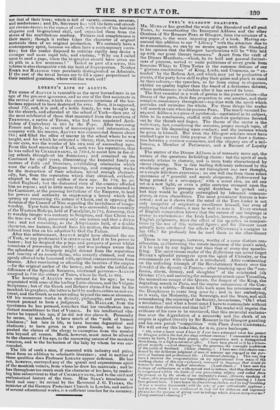LORENZ'S LIFE OF ALCUIN.
THE name of ALcutal is venerable as the most learned man in an
age of the grossest ignorance, and as one of the first assistants in the revival of letters, which the successive invasions of the bar- barians appeared to have destroyed for ever. Born, it is supposed, about 735, and, it is said, of a noble family, he was brought up for the church, and educated at the school of York—then one of the most celebrated of those that emanated from the exertions of
THEODORE, a native of Tarsus, who had been appointed Arch-
bishop of Canterbury in 663 by the Pope. After traversing France and Italy, in search of manuscripts and information, in
company with his master, ALCUIN was consecrated deacon about
766; and filled the office of master in the school where he wrs taught, and for which he collected a library, that, however scant in our eyes, was the wonder of his own and of succeeding ages.
From this head masterhip of York, such was his reputation, that be was called by CHARLEMAGNE, in 7804, to assist him in found-
ing schools throughout his dominions; and remained on the Continent for eight years, illuminating the Imperial family on matters of faith and literature, establishing seminaries which were the cradle of European learning, and composing works for the instruction of their scholars, trivial enough abstract- edly, but, from the reputation which they obtained, evidently adapted to the mental calibre of their age. In 790, he re- visited England ; but the distracted state of the country afforded him no repose ; and in little more than two years he returned to the Continent, at the pressing invitations of the Emperor, to lend his powers and authority in suppressing a heresy which had sprung up concerning the nature of Christ, and in opposing the decision of the Council of Nice regarding the lawfulness of image- worship. Upon both these points he was successful; the assembly of the Western Bishops, held at Franckfort, in 794, decreeing, that
to worship images was contrary to Scripture, and that Christ was the true son of' God, possessing only one nature and that a divine one ; and not consisting, as the Adoptionists held, of a double character, one human, derived from his mother, the other divine, infused into him on his adoption by God the Father.
After this achievement, ALcui ar might have obtained the see of York, or any preferment CuaRLEmaGNE had it in his power to bestow ; but he despised the pumps and gewgaws of power whilst conscious of possessing the reality ; and was perhaps aware that the splendour of a bishopric might detract from the reputation and sanctity of an ascetic divine, who covertly claimed, and was openly allowed to be honoured with, spiritual communications from heaven. After convincing or silencing the heretics of the empire —for the original author of the heresy, safe under the infidel in- difference of the Spanish Saracens, continued perverse—Asculat accepted in 796 the abbacy of Tours, where he died, in 304. The learning of ALcsnat was eminent for his age ; he was acquainted with some of the leading Latin classics, and the Vulgate
Scriptures ; but of the Greek and Hebrew claimed for him by his monkish biographers, the latter is held by modern.critics as non-ex- istent, and the Greek as not extending beyond the merest elements. Of his numerous works in divinity, philosophy, and poetry, we cannot pretend to form a judgment. Mr. HALLAM, from the .specimens he has perused, considers that his versification has a distant resemblance to that of VIRGIL. In his intellectual cha- racter he topped his age, if he did not rise above it. Personally he seems, in manhood, to have much of the "milk of human kindness ;" but late in life, to have become dogmatical and obstinate ; to have given in to pious frauds, and to have pushed the claims ot the clergy to exemption from the secular arm beyond all reason. Much, however, must must be allowed to the character of his age, to the narrowing nature of the monkish vocation, and to the barbarism of the laity by whom he was sur- rounded.
The life of such a man, if executed with industry and pains, must form an addition to scholastic literature; and in neither of these qualities does Professor LORENZ appear deficient. He has
not, however, conveyed any of the quaint and superstitious spirit of the monkish writers, from whom he drew his materials ; and he has throughout too much sunk the character of his hero, by render-
ing him subservient to that of CHARLEMAGNE, and to the civil and ecclesiastical history of the time. Miss Sizes translation is lucid and easy : its revisal by the Reverend J. G. TIARKS, the minister of the German Protestant Church in London, and author of several educational works, is a sufficient voucher for its accuracy.


























 Previous page
Previous page